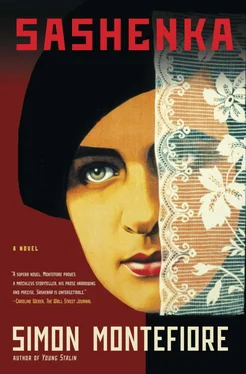Kobylov felt like the hunter who corners the noble stag and even as he aims his rifle at its heart he cannot help but admire it. He marveled at her self-possession and her courage.
Sashenka ran her fingers over her lips and met Kobylov’s gaze. “I want to start on the day I was arrested by the Okhrana outside the Smolny Institute in St. Petersburg in the winter of 1916. That was how I came to be recruited by the Tsarist secret police and thence by British, German and Japanese intelligence and their hireling, Trotsky. May I start on the day it all began?”
Carolina heard the door of her hotel room close quietly. The room seethed with insects: the ceiling, even the bedspread, was covered in a blanket of glistening black bodies like living caviar. The children had been fascinated by them. In one twin bed, Carolina had slept with Carlo curled around her to form a single sculpture. After the station, it had seemed the most luxurious room on earth. But now, as she sprang awake from a sleep fathoms deep, she knew that click of the lock could mean only one thing.
She jumped up and ran to the window and, placing her hands on the glass, she stared, wild eyed, down at the street below. Among the horse-drawn carts, trucks and Pobeda cars, she saw women in floral dresses and red headscarves, and the pea-green uniforms of a provincial Soviet town. Then she spotted the children far across the square, walking toward the station.
They were holding Mrs. Lewis’s hands, two tiny far-off figures. But she knew every mannerism of their gaits, the way Carlo stomped along and Snowy’s long-legged, bouncing grace, so like her mother’s. For a moment, Carolina longed to run after them and catch them and hug them over and over again…But already she knew this leave-taking was for the best.
The train would be shunting forward, the momentum shifting too. Soon Snowy and Carlo would be leaving another beloved figure behind and moving into a new existence.
She cried loudly and openly and for a long time in the room.
She cursed this gentle nanny, this Lala, who now had the children. Perhaps Lala would keep them, and even though she could never care for them as lovingly as she herself (no one alive could do that!), they would be better with her than with strangers. But Carolina knew too that Lala could not keep them forever; that she had some dangerous connections, and connections had to be avoided, Comrade Satinov had explained. So Lala was taking them somewhere else. She had mentioned an orphanage in Tiflis, but that was for the paperwork. There the children’s identities would be laundered and their adoptions made official.
The night before, it had been hard to get the children to sleep even though they were exhausted and so grateful for the beds. They cried out for their mummy and daddy. The two nannies stroked them, hugged them and fed them their favorite cookies until in the end the children had hugged them back and surrendered to sleep.
Then the two nannies had sat in the bathroom and Carolina had talked with a frowning intensity, passing on everything she knew about the children: what they loved, what they hated, what foods, what hobbies, what books. At the end, in a sort of agony, she had whispered, “Tell the new parents about the Cushion, tell them about the bunnies. It’s all they have left of their lives!”
And Lala had understood. “I know what sensitive children they are, Carolina. I cared for Sashenka for so long…”
“What was she like?” asked Carolina. “Was she like…?” and she looked toward the bedroom—but then she could speak no longer. No more details. It would be more than either of them could bear.
The two women, the Englishwoman and the Volga German, embraced in tears. In the end, lying each with one of the children, they managed to fall asleep too in the warm hotel room looking out over the Don, where Peter the Great had once sailed.
As she packed her bag and caught the bus to return to her little village, Carolina remembered how the three figures had wound their way toward the station. They were pulling the tottering Lala in different directions, laughing, she thought, from the way Carlo was tossing his head back and Snowy was skipping. She realized that she was seeing Snowy and Carlo Palitsyn for the last time. Very soon, they would be different children with new names, belonging to other families.
“Good-bye, my absolute darlings!” she said aloud. “God bless you. May my love travel with you wherever you go and whomsoever you become.”
To what awaited her, she gave not a thought.
There were such kind women as Carolina, in the agony of Russia, when even the most decent people became cruel or turned their eyes away. Such paragons were rare. But they existed. They alone kept the candles of love alight.
It was high summer, the time of year when Tiflis becomes a balmy, baking city of outdoor cafés and strolling boulevardiers. In the Café Biblioteka, Lala Lewis was pouring red wine for one of her regulars when the doors opened.
An ancient waxy-skinned man entered in a battered, dusty sepia-colored suit with a little leather suitcase. He sported a neat grey mustache, and walked painfully in pigeon steps toward the cashier’s desk. Tengiz the manager was not sure if he recognized this ghostly wraith: could it be a miracle? One of the “lucky stiffs” back from the dead?
The Englishwoman watched his staggering progress silently for a moment, her eyes opening wider and wider, her mouth breaking into a scream before any sound came out.
Then she gave the most girlish yelp, as if she were sixteen years old, and almost skipped across the wooden floor to meet her husband. She had recognized the “former person” Samuil Zeitlin, who had been arrested in 1937, sentenced to death but reprieved by a centimeter of ink from the pen of Comrade Stalin and dispatched to the Kolyma Gulags in northeastern Siberia. Then, a few short months ago, against all the odds of Fate, Zeitlin, the ultimate class enemy, had been reprieved again.
“Good God!” said Lala in English. “Samuil! You’re alive! You’re ALIVE!” She threw herself into his weak embrace, nearly knocking him over. It had never occurred to her that he might still live. She quickly poured him a thimble of brandy and he swallowed it and sighed.
“Thank God you’re still here, darling Lala,” he said, falling to his knees, right there in the café, and kissing her hands and even her feet.
“Let’s get you up,” she said, pulling him to his feet, anxious not to make any more of a scene. “You really are a miracle. Since the Terror ended, a few have come back—lucky stiffs is what they call them.”
“If you only knew, but you’d never believe it, the things I saw on the way to Kolyma, the things I saw men do to other men…”
Lala sat him down at a table and brought him a glass of brandy, a plate of lobio beans and a hot slice of khachapuri . He told how a strange thing had happened to him. An NKVD guard had come to the office, where he worked as camp accountant in the faraway hell of Kolyma, and summoned him to the commandant’s apparat, where he was asked to sign for his belongings. He was given his old suit and shoes then invited to lunch by the commandant, who served veal cutlets, by coincidence almost the same dish cooked daily by Delphine at the mansion on Greater Maritime Street. He was taken to the barber’s shop (the barber was a former nobleman). Then, with a small allowance, he was freed to set off on the long, slow journey back to Tiflis.
When he was a little restored, she and Tengiz helped him upstairs to her room. Tengiz brought them hot water. When the manager was gone, she undressed Zeitlin and washed his frail body with a warm sponge.
Читать дальше












